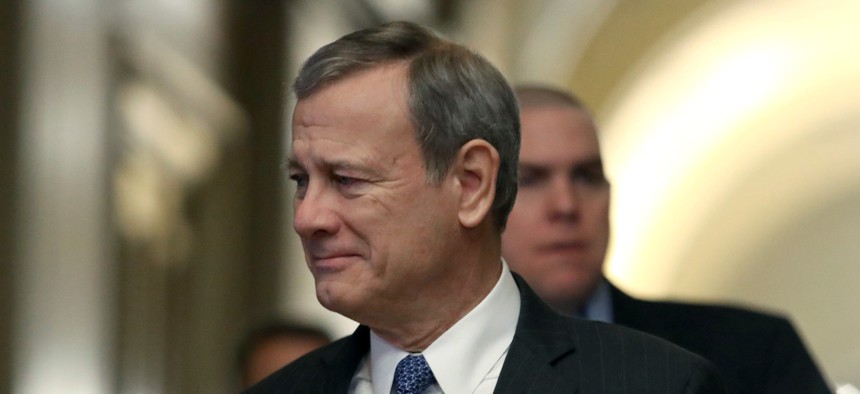Supreme Court hearing turns to the contractor mandate

Chief Justice John Roberts showing arriving at the U.S. Capitol for the Senate impeachment trial of U.S. President Donald Trump, on January 31, 2020 Mark Wilson/Getty Images
Chief Justice John Roberts invoked the federal contractor mandate – currently blocked from taking effect due to a lawsuit – at a hearing at which two separate vaccine authority cases were argued on Friday.
The vaccine mandate for federal contractors emerged as a topic in a rare, expedited Supreme Court proceeding on Friday that was convened to weigh objections to COVID-19 rules covering healthcare workplaces and private businesses.
One case centers on the Occupational Safety and Health Administration's rule requiring companies that employ more than 100 people to institute a vaccine requirement or test regularly. Another looks at a mandate from the Centers for Medicare and Medicaid Services that requires healthcare facilities that accept Medicare and Medicaid payments to require that their employees be vaccinated.
While the two cases revolve around different legal questions, Chief Justice John Roberts, during questioning in the OSHA case, invoked the contractor mandate – currently blocked from taking effect due to a separate lawsuit.
"It's a little hard to accept the idea that this is particularized to this thing. That it's an OSHA regulation, and it's a CMS regulation. That it's a federal contract regulation," Roberts said. "It seems to me that the more and more mandates that pop up in different agencies, I wonder if it's not fair to look at the court as a general exercise of power by the federal government, and then ask the questions, ‘Well, why isn't Congress have a say in this, and, why doesn't this be primarily the responsibility of the states?’"
Roberts noted that with these cases and the contractor case, the government is arguing that the agencies were acting because of a grave danger, eventually asking if the court should look broadly at the ability of agencies to implement these mandates.
Elizabeth Prelogar, U.S. solicitor general, told Roberts that OSHA was relying on "express statutory authority."
"The fact that there are other agencies here that, likewise, we think are empowered to act to protect America against what is happening in this country right now shouldn't diminish the force of the express statutory authorization," she said.
The plaintiffs in the OSHA and CMS cases are asking the Supreme Court to block implementation of the rules while lawsuits proceed in lower courts. The rule requiring most federal contractors to obtain vaccinations or follow masking and distancing regimes is currently blocked from taking effect because of a district court ruling in December.
Alan Chvotkin, a partner at the law firm of Nichols Liu and a longtime specialist in government contracting law, told FCW that if the High Court agrees to block the implementation of OSHA and CMS requirements, "that would be a pretty good signal that that's how they would evaluate the [the Federal Property and Administrative Services Act] scope of authority for contractors."
Either way, he stressed, what contracting companies ultimately want is clarity.
"Just tell us what the rules are. Make a decision," Chvotkin said. "The ambiguity and the uncertainty is worse."
The OSHA rules are set to take effect on Monday, barring action by the Supreme Court. The CMS rules are in a different phase – a federal appeals court in Florida declined to issue a stay while another court in Louisiana blocked the rules from taking effect in the jurisdiction of the Court of Appeals for the Fifth Circuit.
The contractor mandate case is wrapped up in a lawsuit in a district court in Augusta, Ga. At present, the federal government is seeking clarification on the stay – to find out whether the government can enforce the masking and social distancing portions of the mandate and whether companies can voluntarily accept the government contract clause requiring vaccination.



